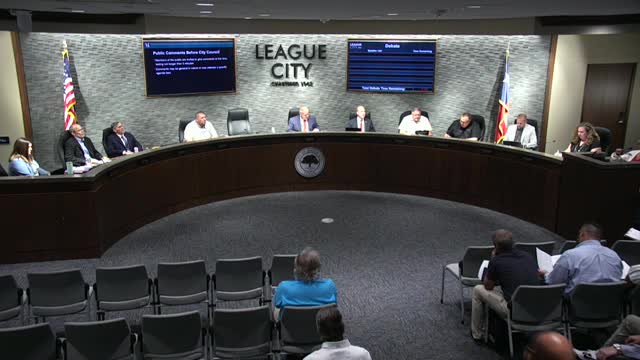League City council approves first reading of revised noise ordinance after debate over animal-noise language and golf-course exemptions
Get AI-powered insights, summaries, and transcripts
Subscribe
Summary
On Oct. 14, 2025, the League City Council approved on first reading an amendment to Chapter 42 that creates a special-event sound permit, clarifies exemptions and leaves animal-noise language in place after an unsuccessful amendment to remove it; council also clarified an exemption related to golf-course maintenance hours.
League City Council approved on first reading an amendment to Chapter 42, Article 2 of the city code relating to noise on Oct. 14, 2025, after roughly an hour of public comment and council discussion. The motion to approve the ordinance passed 6-1 with one member absent.
The ordinance updates League City’s noise rules by clarifying exemptions, establishing a special-event sound permit process and refining enforcement language. One of the most contested changes during debate was a provision that repeats animal-noise language already found in the city’s nuisance code; an amendment to strike the animal-noise language failed on a council vote.
The debate drew public comment from residents who live on golf-course property and from homeowners near course fairways. Stephen Morris, who identified himself as owner and operator of South Shore Harbor Country Club, told the council that golf-course maintenance routinely begins earlier than typical residential lawn care and asked that the ordinance explicitly recognize that need: “We start at 05:30AM. To maintain a golf course…there’s no possible way we could operate a golf course by starting at 7AM,” Morris said during public comment. Several other South Shore Harbor residents corroborated that the course has operated on an earlier schedule for decades and said the maintenance supports property values.
Council discussion focused on balancing enforceability and discretion for officers with protections for animals and homeowners. Councilmember Chad Tressler urged caution about rewriting a broadly useful enforcement tool: “We have to get it right for most situations most of the time,” he said, arguing the existing, more general language gives officers and courts discretion to handle varied situations.
The council also heard from the police chief (name not provided on the record), who described the department’s approach as aimed at voluntary compliance and noted that although the department receives many calls about barking dogs, it issued only two citations in the past 12 months related to noise or nuisance matters. “Our primary goal is typically voluntary compliance,” the police chief told council, adding that officers apply a totality-of-the-circumstances standard and look to the court’s reasonableness test when enforcement is necessary.
An amendment offered during debate sought to remove the animal-noise language from the revised noise ordinance on the grounds that the matter is already covered in the city’s nuisance code and should be left to animal-control personnel. The amendment was put to a vote and failed (2–5). The council then voted to approve the original ordinance language on first reading (6–1, 1 absent). The ordinance will return for a second reading and final action at a future meeting.
City staff noted one procedural point about exemptions: the existing code includes a parenthetical clause that allows the director of planning and development to approve deviations, so some adjustments for things like early golf-course maintenance have been handled administratively in the past. Councilmembers said they expect to continue working with staff to clarify how exemptions are applied across multiple golf courses in the city.
Councilmembers and speakers asked staff to follow up with more outreach to other neighborhoods with golf courses before final adoption. Councilmember comments ranged from urging limited government intervention to seeking clearer wording that is defensible in court.
What happens next: the ordinance returns for a second reading where council may adopt final language, including any clarifying edits staff brings back after the outreach and review requested during this meeting.
